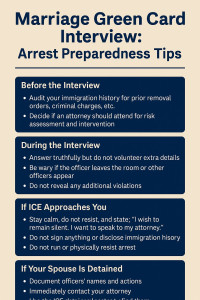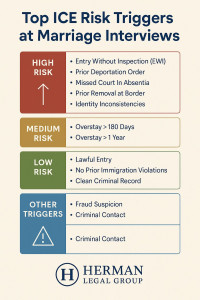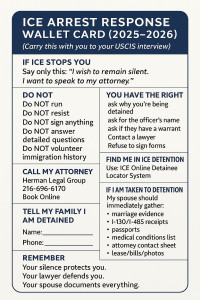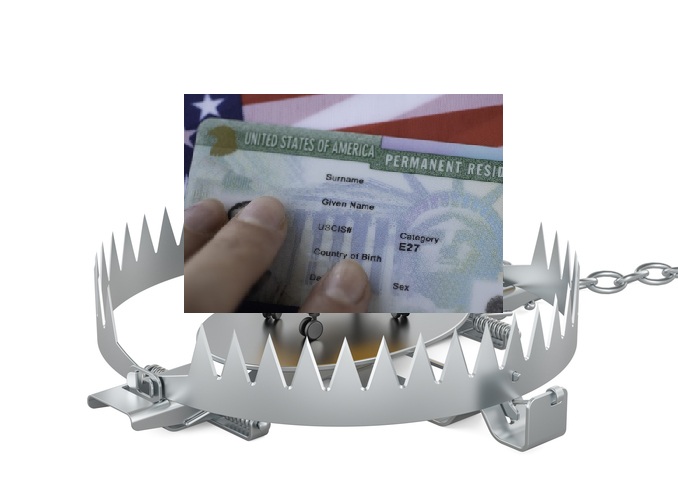(Herman Legal Group — 2025–2026 Investigative Legal Analysis)
Quick Answer (What Immigrant Families Must Understand Immediately)
Yes — ICE is now detaining people inside USCIS offices during marriage-based green card interviews.
The first wave of arrests occurred in San Diego in November 2025, where multiple visa-overstay applicants — including military spouses — were handcuffed inside a federal building after checking in for their marriage interview.
(NBC San Diego)
What changed?
A new 2025–26 enforcement strategy driven by:
- A historic increase in DHS/ICE funding
- Project 2025 prioritizing mass interior enforcement
- ICE pressure to produce arrest numbers
- Expanded detention bed capacity
- USCIS sharing interview schedules and applicant data with ICE
- Targeting “low-risk, high-efficiency” overstays
- Public outrage being low because arrests happen inside federal buildings, out of view
For decades, overstays married to U.S. citizens were not arrested at interviews.
In 2025, that protection vanished.
Explore HLG’s leading guides on this issue:
Fast Facts
- Confirmed arrests: At least six in San Diego between Nov 12–27, 2025.
- Trigger: Visa overstay — not fraud, not crime.
- Victims: Military spouses, parents, F-1/B-2 overstays, Europeans, Asians, Australians.
- Where: San Diego field office (first confirmed), likely expanding.
- Why: Political pressure + historic enforcement budget + interior enforcement surge.
- What’s different: For 14 years, these overstays were forgiven during adjustment.
- Now: Overstay = enforcement opportunity, not forgiveness.

Introduction — What Was Once Safe Is Now the Site of Arrests
For decades, spouses of U.S. citizens — including military families — walked into USCIS marriage-based interviews confident they were safe.
The rule was simple:
If you entered legally and overstayed, the marriage green card forgives it.
But in November 2025, that long-standing practice collapsed.
Dozens of immigrants across San Diego, including military spouses from Europe and Asia, were arrested inside the USCIS office.
(NBC San Diego)
(India Today)
These arrests were not fraud cases.
They were not criminals.
They were simply overstays — people who had done everything right except maintain valid status.
What changed is not the law.
What changed is enforcement strategy, resources, political incentives, budget priorities, and inter-agency coordination.
This article explains exactly why.

What Changed at USCIS in 2025–2026
Before (2010–2024):
- Overstays forgiven for marriage-based adjustment
- Approvals common if marriage was real
- ICE avoided arresting overstays
- Detention beds full
- USCIS did not coordinate closely with ICE
- NTA issuance used sparingly
Now (2025–2026):
- ICE has massive new budget + interior enforcement mandate
- More detention beds
- Project 2025 alignment
- Public outrage threshold low
- Marriage interview = predictable target window
- ICE positioned inside or near USCIS buildings

Section 1 — What Changed in 2025?
How Interior Enforcement Quietly Shifted Overnight
1. Record DHS/ICE Budget Expansion
ICE received one of the largest interior-enforcement funding increases in modern history, including:
- More detention beds
- More field officers
- Increased transportation and processing capacity
- Expanded data-sharing systems with USCIS
ICE simply has more manpower and space to carry out arrests that were previously impractical.
2. Project 2025 Influence (Even Without Formal Adoption)
Project 2025 emphasizes:
- Mass interior removals
- Targeting overstays
- Merging USCIS and ICE functions
- Using administrative data to identify easy arrests
- Making every immigration interaction “an enforcement opportunity”
Even unofficially, these ideas have influenced DHS enforcement culture.
3. Internal Pressure for Arrest Numbers
ICE does not publish quotas, but DHS measures “interior enforcement productivity.”
Field offices are expected to show:
- Increasing arrests
- Increasing detentions
- Increasing removals
And overstays are the easiest numbers to produce.
4. Marriage Interviews Provide the Perfect Arrest Window
Every marriage-based interview includes:
- Pre-screened building entry
- Identity verification
- Documented overstay admission
- Predictable schedule
- A confined environment
This is the least risky and least costly place for ICE to arrest someone.
5. The Public Isn’t Seeing It — So There’s No Political Cost
Arrests inside federal buildings generate:
- No cellphone videos
- No raids
- No public panic
- No viral optics
This “quiet enforcement environment” makes arrests politically safe.

Section 2 — Why Overstays Are the Primary Target (The Enforcement Logic)
1. Overstays Now Exceed Border Crossings
DHS overstay reports show that visa overstays are now the largest driver of undocumented population growth, making them a central enforcement target.
2. Overstays Equal Easy Arrests
ICE prefers arrests that are:
- Predictable
- Safe
- Controlled
- Low-cost
- Documented
USCIS interviews check all boxes.
3. USCIS Is Sharing More Data Than Ever
USCIS sends or allows access to:
- Interview schedules
- Prior immigration history
- FDNS flags
- I-94 expiration
- Background check details
- Fraud referrals
The firewall between “benefits” and “enforcement” is nearly gone.
Section 3 — Why USCIS/ICE Did NOT Arrest Overstays Before (2010–2024)
(The part most media outlets are missing entirely)
For 14 years, overstays married to U.S. citizens were considered the safest category in the entire immigration system.
Here is why:
1. Overstays Were Legally Forgiven in Marriage-Based Cases
Immediate relatives could adjust even after overstay.
If the marriage was real and no other bars applied, USCIS simply approved the case.
Arresting them was unnecessary and counterproductive.
2. There Was No Need to Arrest Them
Because they were eligible for a green card, the goal was to complete the adjudication — not detain them.
There was no enforcement benefit.
3. Arresting Overstays Was a Massive Waste of Government Resources
Putting a spouse in removal meant:
- Immigration court hearings for years
- Government attorneys litigating avoidable cases
- Detention for weeks or months
- Transportation, storage, staffing
- Court backlog expansion
And the immigrant often got approved anyway, inside immigration court.
It was a bureaucratic absurdity.
4. Overstay Is a Civil Infraction — Not a Crime
Overstaying a visa is not a criminal act.
It is a civil violation — like overstaying a parking meter.
Handcuffing someone for a civil infraction was seen as:
- Immoral
- Disproportionate
- Bad for public trust
- Politically explosive
5. USCIS Could Always Issue an NTA Instead of Arresting
USCIS had a non-violent solution:
Issue a Notice to Appear (NTA) without arrest.
This placed the immigrant in removal proceedings without detention or family separation.
Arrest + NTA was unnecessary cruelty.
6. ICE Lacked the Resources
From 2010–2024, ICE faced:
- Full detention centers
- Staffing shortages
- Budget constraints
- Prioritization of criminals and fugitives
Arresting overstays was considered:
“An inefficient use of limited enforcement resources.”
7. The Old Approach Was Practical, Humane, and System-Smart
Everyone knew:
- Arresting eligible spouses was pointless
- It created unnecessary suffering
- It clogged courts
- It cost taxpayers enormous money
- It delayed green cards for no reason
So the system did not do it.
Until 2025.
Section 4 — Why Everything Changed (2025–2026)
The government did not suddenly “realize” overstays are deportable.
They always knew.
What changed is the political will + budget + operational capacity.
2025–26 is the first time in decades that government has had:
- A political mandate for mass interior enforcement
- The budget to carry it out
- Muscular ICE–USCIS coordination
- Low public awareness or outrage
This is why overstays are now being arrested in marriage interviews.
Section 5 — Real Cases
1. Multiple Arrests in San Diego (Nov 2025)
2. Military Spouses Detained
3. Norwegian Diabetic Woman Arrested at Interview
4. Australians, Europeans, Asians Targeted
(India Today)
(NDTV)
Section 6 — What This Means for Your Marriage Interview (2025–2026)
If you overstayed a visa, you must assume risk when attending a USCIS interview.
HLG guide:
USCIS Marriage Interview Overstay Arrest Guide

Section 7 — Tools & Checklists: “Marriage Interview Survival Kit”
1. Arrest-Risk Checklist

2. ICE Response Wallet Card

Section 8 — Key Insights USCIS Will Never Tell You
-
USCIS is not legally obligated to prevent ICE from entering interviews.
-
ICE can use your own admissions (overstay) as the basis for detention.
-
USCIS officers may delay interviews to give ICE time to arrive.
-
ICE monitors interview schedules through system flags.
-
USCIS is quietly increasing fraud & security referrals to ICE.
-
Overstays once considered “routine” cases are now “enforcement opportunities.”
-
USCIS officers are trained to report status violations.
-
Denial + NTA pipeline has tightened dramatically in 2025.
-
ICE prefers interviewing buildings because they are secure, controlled, and quiet.
Section 9 — Community Impact
Immigrant Families:
Fear of attending interviews; spikes in consultation requests.
U.S. Citizen Spouses:
Shock, trauma, public outrage brewing (but not national yet).
Military Families:
Deeply affected — spouses detained despite military service.
Local Communities:
Chilling effect on all marriage-based filings.
USCIS Offices:
Reports of empty waiting rooms in some cities.
Section 10 — What We’re Seeing in 2025–26 (Attorney Observations)
HLG has observed:
-
Huge uptick in emergency consultations
-
Families considering withdrawing I-485s
-
Detained applicants stuck for months without bond
-
Field offices behaving differently — some much more aggressive
-
A rise in NTAs after marriage interview denials
As Richard Herman often explains:
“The marriage interview was once the solution. Today it can be the trigger.”
Section 11 — FULL 60-QUESTION FAQ
1. Are people really being arrested at USCIS marriage interviews?
Yes. Multiple verified cases occurred in November 2025 at the USCIS San Diego Field Office. Arrests were based on visa overstays, not criminal conduct.
(NBC San Diego)
2. Why is ICE choosing to arrest people inside USCIS offices?
Because USCIS buildings are controlled, secure, pre-screened environments — low cost, low risk, high efficiency, and perfect for high-volume interior enforcement.
3. Why now? Why did this start in 2025?
ICE’s enforcement capacity and budget dramatically expanded in FY2025 combined with political pressure, performance metrics, and Project 2025 priorities emphasizing interior removals.
4. Are overstays now considered enforcement priorities?
Yes, in practice. Although the law still allows spouses of U.S. citizens to adjust despite overstays, ICE has begun treating overstays as actionable violations.
5. Does a pending I-130 protect me from arrest?
No. A pending petition does not protect you from ICE custody.
6. Does having a clean criminal history protect me?
No. Recent arrests involved people with absolutely no criminal records.
7. If I entered legally on a visa but overstayed, can ICE arrest me at the interview?
Yes. These are the cases currently targeted.
8. Should I attend my marriage interview if I overstayed?
Not before consulting a qualified immigration attorney. Review the HLG guide:
USCIS Marriage Interview Overstay Arrest Guide
9. Does it matter if my spouse is a U.S. citizen?
ICE has arrested spouses of Americans, including military spouses.
10. Does ICE need a warrant to arrest someone inside USCIS?
No judicial warrant is needed for arrests based on civil immigration violations inside federal buildings.
11. Are USCIS officers involved in the arrests?
USCIS itself does not arrest applicants, but information-sharing with ICE enables arrests.
12. Does USCIS notify ICE about my interview time?
Yes. ICE can access scheduling systems and interview calendars.
13. Do I have to answer questions from ICE if they approach me at USCIS?
No. You have the right to remain silent and request an attorney.
14. Can ICE wait in the interview hallway?
Yes. Recent arrests occurred in waiting areas and hallways.
15. Can ICE enter the interview room?
Yes. ICE has authority to enter USCIS interview rooms.
16. Are these arrests legal?
Legally, yes. Practically, they represent a major shift in enforcement.
17. Is this happening only in San Diego?
San Diego is the first confirmed field office, but nothing legally prevents other offices from adopting identical tactics.
18. Will this spread nationwide?
Given the political incentives, expanded budgets, and ICE–USCIS coordination pipeline, lawyers expect expansion unless DHS restricts the practice.
19. Why aren’t people more outraged?
Because arrests occur inside federal buildings — out of public view, with minimal spectacle.
20. Why weren’t overstays targeted in the past?
Detention bed shortages and limited ICE manpower made overstays “low priority” before 2025.
21. Does marriage fraud have anything to do with these cases?
Not in the San Diego cases. These were legitimate marriages involving overstays.
22. How does ICE know if I overstayed?
Through your I-94 record, visa history, interview forms, and USCIS’s internal databases.
23. Does USCIS warn applicants about ICE risk?
No. USCIS provides no warnings about ICE presence.
24. Should I bring a lawyer to my interview?
Yes. Especially if you overstayed. Attorneys can intervene or delay interviews if ICE appears.
25. Can my lawyer stop the arrest?
Not always, but your lawyer can:
-
Confirm ICE’s grounds
-
Request supervisory review
-
Begin immediate bond motions
-
Prevent self-incriminating statements
26. Can ICE detain my U.S. citizen spouse?
No. ICE cannot detain citizens.
27. What happens to my application if I’m detained?
USCIS often denies or administratively closes the I-485; the I-130 may remain pending or be abandoned.
28. Will ICE try to deport me immediately after arrest?
Detention and NTA issuance happen quickly; expedited removal is possible if prior orders exist.
29. Will ICE separate me from my children?
Yes, if you’re detained, your children cannot accompany you.
30. What if I have medical conditions?
You will still be detained. A diabetic Norwegian woman was held despite serious medical needs.
(10News)
31. Can ICE detain military spouses?
Yes. Multiple San Diego cases involved military families.
32. Can I be arrested even if the interview goes well?
Yes. Arrests often occur before the interview even starts.
33. Does filing for advance parole protect me?
No. Overstay remains actionable.
34. Should overstays travel internationally with advance parole in 2025–26?
Not without legal review; reentry risk has increased sharply.
35. Should I withdraw my I-485 to avoid arrest?
This can sometimes reduce immediate risk, but it also cripples your green card path. Must be evaluated case-by-case.
36. How early does ICE prepare for these arrests?
Sometimes days in advance, based on interview schedules.
37. Does the attorney need to call USCIS before the interview?
Yes. Attorneys often contact USCIS to assess risks and potential ICE presence.
38. Will USCIS reschedule my interview if I fear arrest?
Not usually without strong legal justification.
39. Should I file FOIA before attending?
Yes. FOIA may reveal risks or ICE flags, though processing takes time.
40. What if ICE shows up at the entrance before I get inside?
Remain silent, ask for your lawyer, do not explain immigration history.
41. Does being pregnant help prevent detention?
ICE can and does detain pregnant individuals.
42. Does having U.S. citizen children help?
Not at USCIS interviews. Detention still occurs.
43. Will ICE let me call my attorney from detention?
Yes, but you may have limited access depending on the facility.
44. How soon can a lawyer request bond?
Immediately after NTA issuance, but bond decisions may take days or weeks.
45. Can overstays still legally adjust status through marriage?
Legally yes — but practically the risk of arrest has drastically increased.
46. Is unlawful presence under 180 days safer?
Lower risk, but still not risk-free.
47. Is F-1 student overstay treated differently?
ICE treats all overstays the same for enforcement purposes.
48. Does an approved I-130 prevent arrest?
No.
49. If arrested, will ICE separate me from insulin or medications?
Medical care is inconsistent and sometimes inadequate.
50. Can the interview be converted to a video interview?
Rarely, and usually only in exceptional circumstances.
51. Could ICE use body cameras at USCIS?
Yes. ICE deploys body-worn cameras in some operations.
52. Does the timing of the interview day matter?
Arrests often happen early morning when ICE presence is highest.
53. Do arrests happen before or after the interview?
Before, during, or immediately after — but most San Diego cases happened before the interview.
54. How do I know if ICE is targeting me specifically?
You cannot know without legal review of your full immigration history and FOIA records.
55. What if my interview notice says “Bring your passport”?
This is normal — but passports also help ICE process removal.
56. Should I go to the interview if I accrued unlawful presence and then left the U.S.?
Very risky. Bars and reinstatement issues multiply ICE exposure.
57. Does filing a motion to reopen past removal orders help?
Sometimes — but must be done before attending the interview.
58. What should I do if ICE begins questioning me?
Remain silent, ask for your attorney, do not sign anything.
59. How can I prepare for the worst-case scenario?
Work with an attorney on:
-
Emergency plan
-
Family communication
-
Document packet
-
Bond plan
-
NTA strategy
HLG can assist.
60. What is the safest step to take right now?
Book a consultation with an experienced attorney before your interview:
Schedule with Herman Legal Group
If You Are Overstayed and Have a Marriage Interview Coming Up, Do Not Walk Into USCIS Alone.
The 2025–2026 arrest wave at green card interviews is not a rumor. It is a documented trend.
The law may still forgive overstays for marriage-based cases — but enforcement practices no longer do.
If you or your spouse has:
- a visa overstay,
- a marriage interview scheduled,
- a past denial,
- a prior entry issue, or
- any immigration history that could trigger ICE,
then you are now part of the exact group that agents are targeting inside USCIS buildings.
This is not the moment to “hope for the best.”
A single mistake, a misunderstood answer, or an unreviewed I-485 packet can turn a routine interview into a life-altering detention.
For more than 30 years, Herman Legal Group has represented families in
- marriage-based green card cases,
- ICE detention emergencies,
- FDNS investigations,
- overstay forgiveness, and
- high-risk USCIS interviews in every state.
We understand exactly how the new enforcement system works — and how to help you avoid becoming its next target.
Get a confidential, attorney-led strategy session before your interview.
This is your chance to ask the hard questions:
- “Am I a target?”
- “Should I attend?”
- “What are my real risks?”
- “Can ICE legally detain me?”
- “What is the safest path forward?”
You do not need to face this alone.
Book a consultation with Herman Legal Group today:
Schedule Your Legal Strategy Session
One hour of preparation can prevent a life-changing arrest.
Protect yourself. Protect your spouse. Protect your future.
Call Richard Herman at 216-696-6170

Massive Resource Directory
(Government • Media • Legal • Data • HLG Authoritative Guides)
I. Government Resources (USCIS • ICE • DHS • EOIR • DOS • Federal Register)
USCIS — Core Immigration Benefit Resources
-
USCIS Policy Manual (all sections)
USCIS Policy Manual -
Adjustment of Status (I-485) – Official USCIS Page
USCIS I-485: Adjustment of Status -
I-130 Petition for Alien Relative
USCIS I-130 -
USCIS Marriage-Based Green Card Interview Information
USCIS In-Person Interviews -
USCIS Case Status: “Actively Reviewing Case”
Case Status -
USCIS Biometrics & Background Checks
Background Checks -
USCIS Fraud Detection and National Security Directorate (FDNS)
FDNS Overview -
USCIS Operation Twin Shield – Large-Scale Marriage Fraud Investigation
Operation Twin Shield
ICE – Enforcement, Arrests, Detention, Removal
-
ICE Enforcement and Removal Operations (ERO)
ERO Enforcement -
ICE Detention Locations
ICE Detention Centers -
ICE Online Detainee Locator System (ODLS)
Find a Detained Loved One -
ICE “At-Large” Arrest Policies (Interior Enforcement)
ICE Enforcement -
ICE Budget & Congressional Justification
ICE Budget Resources
DHS — Department of Homeland Security
-
DHS Immigration Enforcement Strategy
DHS Immigration Strategy -
DHS Border & Overstay Reports
DHS Overstay Reports -
DHS Annual Performance Reports (Metrics + Arrest Data)
DHS Performance Reports
EOIR — Immigration Courts
-
EOIR Automated Case Information
EOIR Case Status -
Immigration Court Practice Manual
EOIR Practice Manual -
BIA decisions
BIA Precedents
DOS (Department of State)
-
Visa Reciprocity + Marriage Visa Categories
DOS Visa Information -
National Visa Center (NVC)
NVC Overview
Federal Register (Rules & Notices)
-
All DHS/USCIS/ICE rulemaking
Federal Register DHS Rules -
Recent Notices on Fee Rules, Data-Sharing, Biometrics
Federal Register USCIS Notices
II. Data, Analytics, and Research (TRAC • Pew • Migration Policy Institute)
TRAC (Transactional Records Access Clearinghouse)
Most authoritative immigration court and enforcement data source.
-
TRAC Immigration Court Backlog Data
TRAC Court Backlogs -
TRAC ICE Arrest Data
TRAC ICE Data -
TRAC Asylum Grant Rates by Judge
TRAC Judge Asylum Statistics
Migration Policy Institute
Pew Research Center
III. Verified Media Reports (NYT • NBC • AP • Reuters • KPBS • India Today • NDTV)
(All reports referenced in the article)
San Diego Arrest Incident Reports
-
NBC San Diego – Multiple Arrests at USCIS Interviews
NBC San Diego Report #1 -
NBC San Diego – Military Spouses Arrested at Interview
NBC San Diego Report #2 -
NBC San Diego – Congressional Officials Demand Answers
NBC San Diego Report #3 -
KPBS San Diego – Background on Arrest Strategy
KPBS Analysis
National & International Coverage
-
New York Times – Arrests at Marriage-Based Interviews
NYT Report -
NDTV (India) – “From Green Card Hope to Handcuffed Reality”
NDTV Report -
India Today – ICE Detaining Foreign Spouses at USCIS
India Today Report -
10News San Diego – Diabetic Norwegian Spouse Arrested
10News Report
Reuters / AP – National Trends on Enforcement & DHS Budget
-
Reuters – Immigration Enforcement Pressure & Budgets
Reuters Immigration Enforcement -
Associated Press – DHS/ICE Strategy Coverage
AP Immigration News
IV. Herman Legal Group – High-Authority Immigration Guides
Overstay Arrests & Marriage Interview Risk
Marriage-Based Green Card Guides
Detention, Deportation & Defense
Family Immigration Resources
Consultation (CTA)
V. Legal Community & Policy Analysis
-
American Immigration Lawyers Association (AILA)
AILA -
National Immigration Law Center (NILC)
NILC -
American Immigration Council
Immigration Council
VI. Medical, Humanitarian & Emergency Resources
-
CDC – Medical Screening for Immigrants
CDC Medical Screening -
Mental Health Crisis Hotlines (U.S.)
988 Suicide & Crisis Lifeline -
Detention Medical Care Standards
ICE Health Service Corps
VII. Economic & Policy Resources (For Deep Context)
-
Congressional Research Service (CRS) Immigration Reports
CRS Reports -
Fiscal Data on DHS/ICE Budgets
USAspending.gov -
Brookings Institution Immigration Analysis
Brookings Immigration








